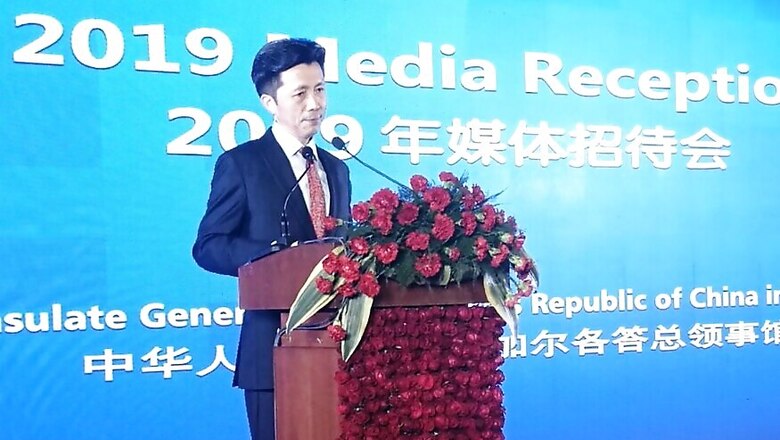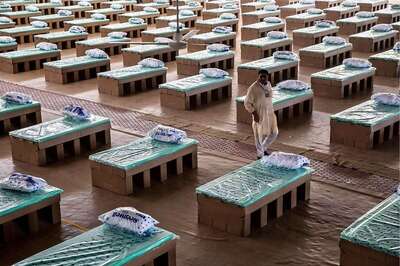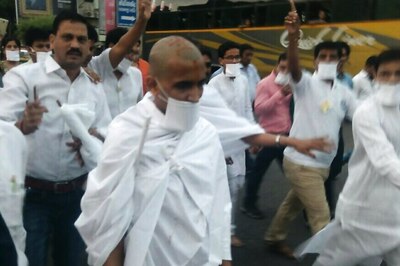
views
Kolkata: Days after India and China held their 22nd round of boundary talks, resolving to find a solution to the Indo-China boundary question, Chinese Consul General in Kolkata, Zha Liyou, said ties between the two countries have strengthened rapidly.
Liyou, who was the National Economic Committee member of the People's Republic of China from 1987 to 1988 and has, over the years, held significant positions including counsellor, department of consular affairs, chinese ministry of foreign affairs, speaks to News18 about his take on the Hong Kong unrest and the “chemistry” Prime Minister Narendra Modi and Chinese President Xi Jinping share. Excerpts from the interview:
Do you think the India-China relationship is moving forward in terms of development?
Yes, of course. Your Prime Minister Narendra Modi and our President Xi Jinping share a very good chemistry. The relations between China and India are moving forward rapidly towards a closer partnership of development. The sub-national ties between Chinese provinces and East Indian states keep getting strengthened with the efforts from my office and through my friends in India. Our consulate has successfully held a series of events, the key ones of which are the Happy Spring Festival Program, the international conference on China and India’s governance experience, the Dragon Boat Festival, and the XuanZang Cup Chinese Speech Contest.
I have met and become friends with so many brothers and sisters, and we work together to promote the China-India friendship. In terms of trade also, we are moving ahead with a comfortable speed. Last year, the volume of India-China business was 95.5 billion US dollars. We witness good business with Mumbai and New Delhi. It is not very impressive in eastern India, but I am sure in future the figures will be good. You have so many chambers of commerce and each of them is powerful. I think to get good trade deal, such chambers of commerce should have a consolidated voice.
While India and China are taking positive steps to strengthen bilateral ties, is there a piece missing that could further strengthen the healthy relationship between the two countries?
Good question. We represent two great civilisations. I worked in China for many years and then I worked in the US before coming to India directly. I tried to compare what is not there (in India). For example, nowadays, Americans has been waging this kind of trade war, tech war, ideological war with China. But despite that, the US-China relationship has been immensely inter-mingled in terms of culture, trade, and people to people exchange etc.
A huge number of Americans and Chinese are traveling to each other’s countries and trying to settle down there. Business houses in China are investing in San Francisco, New York and Washington DC so immensely. On the other hand, I would like to share that in 2018, only two lakh Chinese travelled to India but nearly eight lakh Indians travelled to China. It is a kind of signal that there is something missing to attract more Chinese to India. In simple words, not much efforts have been taken to make an Indian understand what China is all about and a Chinese to understand what India is all about. Therefore, I think the media of both countries needs to play a bigger role to popularise China in India and India in China.
What are the hurdles that both countries are struggling to resolve regarding people-to-people exchange?
Maybe one of them is the language issue. Indians speak very good English, so normally it easier for Indian to think the English way. You (Indians) wish to get more, may be you suppose that you will get more from London, New York because it is so convenient for you. Going to Beijing is not easier for you because you have to speak to a different language. But sometimes we should think about the commitments for strong relationships (despite India’s English way of thinking). In China, we say that a faraway relative is no better than a close neighbourhood.
China is such a close neighbour of India. We have good terms and mutual respect for each other. Chinese are open to Indian ideas of Buddhism and historical stories. I think we need to be flexible and not rigid to make Indians in China and Chinese in India stay comfortably, do business comfortably and make them comfortable in exchange programs. Some small issues over non-issuing of visas or branding a Chinese as a spy and putting them behind bars really hurts. I am trying to appoint a cultural attaché in my office so that she can promote India in China but she has been waiting for her visa for seven months. Though these are minor issues, they certainly become hurdles.
What are your suggestions on improving ties with India? Why, despite the development blueprint of both the countries, there remains a void?
It is true that there are gaps that need to be filled. I think we should let the two leaders (Indian PM and Chinese President) handle it. But on ground level, people like me and my friends in India need to focus more on exchange programs to understand each other. I think this is the only way to clear the confusion among the people of both the countries.
I believe one single incident of rape cannot define a great country like India, and the same goes with China as well. We need to understand (each other) well on the ground level and for that we need to interact more. This is possible only when we have more exchange programs on trade, educations, culture, etc.
I think the bureaucracy and local leaders will play a major role in executing this challenge successfully. Indian civil service system is very stable and fundamental. We need to involve them for this task. Our (India and China) blueprint is ready but we need to move for good things to happen. It’s ‘Incredible India’, right? People want to see it. The day India will prove that incredible India is good enough for young people from China, I think the target will be achieved. Just imagine millions of Chinese visiting India! Imagine the volume of business that will be involved. It will be huge but for that you need good hotels, restaurants and infrastructure. Simply because these issues are there, each year during the Spring Festival, nearly seven million Chinese travel abroad but very few land in India. There are a few but the figure is not very impressive. I believe media also has an important role to play in this regard. Chinese and Indian media should get to know more about each other’s history and culture, and provide more cooperation to for high-quality reports for people of the both countries.
In the past, standoffs like Doklam, Chinese vessels in Andaman sea, aiding Pakistan to block India’s way in declaring JeM chief Masood Azhar as global terrorist came as a big setback for Indo-China ties. What is your take on these issues?
These issues do not fall under my domain. We have geographical jurisdictions. My consular region is West Bengal, Bihar, Jharkhand, Odisha and Chhattisgarh. These questions are Centre to Centre issues. I believe India and China are wise enough to deal with such issues effectively. On ground level, our duty should be to bring the people of both the countries together to understand each other first (before drawing any conclusion about China or India). Now you should ask me who are going to put these things in practice. My answer is, industry houses, NGOs, education institutions, media etc.
We are developing Asian countries and the closer bilateral relations we have, the more benefit our countries and people would have, the more stable and prosperous Asia and the world would become.
Where does China stand today as far the development is concerned? What are the challenges the country is going to face in the future?
Let’s look at the Fourth Plenary Session of the 19th Central Committee of the Communist Party of China (CPC) convened in Beijing in late October. The session reviewed and adopted the CPC Central Committee's decision on major issues concerning how to uphold and improve the system of socialism with Chinese characteristics and advance the modernisation of China's system and the capacity for governance, including party leadership, position of the people as masters of the country, law-based governance, administration system, economic growth, cultural faith, people’s well-being, social governance, ecological protection, independent and peaceful diplomacy, and the party and national supervision. The target is to fully realise the modernisation of China's system and the capacity for governance by 2049 the centenary anniversary of the founding the People's Republic of China (PRC). In one word, the secret to China’s achievement is the CPC’s farsighted vision, strong leadership, effective policies and firm implementation. I think the only challenges we are facing are misleading reports, misconception about China by a section of media.
What do you have to say about the unrest in Hong Kong and the issue of the Xinjiang region?
I have noticed that Indian media pays high attention to China. I have also noticed that Indian media is used to forward news from media of western countries which is fake and meant to discredit China, especially news on Hong Kong and Xinjiang recently with few objective and positive voices. I think this is unfair not only for China, but also for Indian readers, because it is crucial for hundreds of millions of Indian people to learn about their great neighbouring country in a comprehensive and balanced way. We have already made our stand clear about the issue. Issues related to Hong Kong and Xinjiang are purely China’s internal affairs. We resolutely safeguard China's sovereignty, security and development interests, and firmly oppose the interference in China's internal affairs by any force using Xinjiang or Hong Kong related issues. The Western forces’ attempts to sow discord among various ethnic groups in China and contain China’s growth will never succeed.



















Comments
0 comment